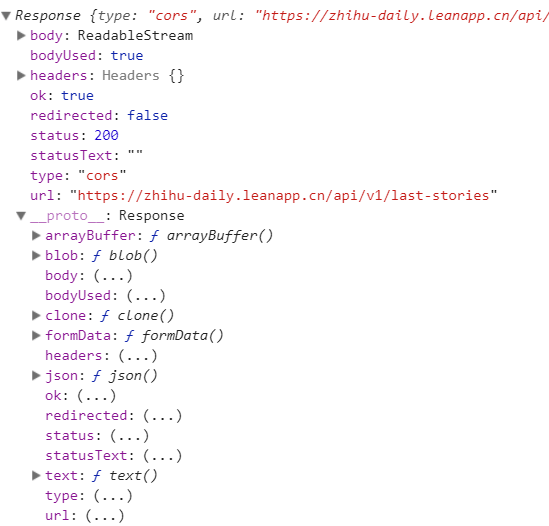# Fetch
在开发过程中, 我们向服务端发送请求, 一般会使用三种方式,
XMLHttpRequest(XHR)、Fetch、jQuery实现的AJAX。
XMLHttpRequest不符合关注分离, 配置和调用方式比较混乱,还需要兼容于多层回调jQuery实现的AJAX兼容性和易用性方面都做了很大的提高,并支持jsonp,但仍存在回调地狱fetch是现代浏览器新增的的一种发送请求方式,用以替代ajax
Fetch API是基于Promise设计,部分老浏览器不支持fetch,旧浏览器不支持 Promise,需要使用如下兼容可兼容到ie8:
- 引入 es6 的 polyfill:
babel-polyfill - 引入 promise 的 polyfill:
es6-promise(参考Promise章节) - 引入 fetch 探测库:
fetch-detector - 引入 fetch 的 polyfill:
fetch-ie8 - 可选:如果你还使用了 jsonp,引入
fetch-jsonp
# npm 命令行安装:
npm install babel-polyfill es6-promise fetch-detector fetch-ie8 --save
js导入:
import 'babel-polyfill';
require('es6-promise').polyfill();
import 'fetch-detector';
import 'fetch-ie8';
注意: fetch-detector 一定要在 fetch-ie8 之前引入
# ie重新封装fetch
# 使用方式
fetch() 接收两个参数 —— 请求资源的路径和配置信息。无论请求成功与否,它都返回一个 promise 对象
fetch(url, options)
.then(res => {
// handle HTTP response
}, error => {
// handle network error
})
# 参数说明:
url:请求资源的路径 (必填)options: 请求配置信息
| 配置项 | 数据类型 | 功能说明 |
|---|---|---|
| method | String | HTTP请求方法,默认为 GET |
| body | String | HTTP的请求参数 |
| headers | Object | HTTP的请求头,默认为{} |
| credentials | String | 默认为 omit , 忽略的意思,也就是不带cookie; 还有两个参数, same-origin ,意思就是同源请求带cookie; include , 表示无论跨域还是同源请求都会带cookie |
# 返回值:
第一个 then 函数里面处理的是 response 的格式,这里的 response 具体如下:

- status(number): HTTP返回的状态码,范围在100-599之间
- statusText(String): 服务器返回的状态文字描述,例如
OK - ok(Boolean): 如果状态码是以2开头的,则为true
- headers: HTTP请求返回头
- body: 返回体,这里有处理返回体的一些方法
# 返回体的处理 (获取返回的数据)
- text(): 将返回体处理成字符串类型
- json(): 返回结果和 JSON.parse(responseText)一样
- blob(): 返回一个Blob,Blob对象是一个不可更改的类文件的二进制数据
- arrayBuffer()
- formData()
返回体处理的返回值均为Promise对象,所以后面可继续使用
then()或catch()进行调用
// 以处理json数据为例:
fetch(url, options)
.then(res => {
return res.json()
}
.then(data => {
console.log(data)
})
# 设置请求头信息
在POST提交的过程中,一般是表单提交,可是,经过查询,发现默认的提交方式是:
Content-Type:text/plain;charset=UTF-8,这个显然是不合理的。
// 通过fetch获取百度的错误提示页面
fetch('https://www.baidu.com/rec?platform=wise&ms=1&rset=rcmd&word=123&qid=11327900426705455986&rq=123&from=844b&baiduid=A1D0B88941B30028C375C79CE5AC2E5E%3AFG%3D1&tn=&clientWidth=375&t=1506826017369&r=8255', { // 在URL中写上传递的参数
method: 'GET',
headers: {
'Content-Type': 'application/x-www-form-urlencoded', // 指定提交方式为表单提交
'Accept': 'application/json' // 通过头指定,获取的数据类型是JSON
},
})
.then((res) => {
return res.json() // 返回一个Promise,可以解析成JSON
})
.then((res) => {
console.log(res) // 获取JSON数据
})
# 携带cookie
默认情况下, fetch 不会从服务端发送或接收任何 cookies, 如果站点依赖于维护一个用户会话,则导致未经认证的请求(要发送 cookies,必须发送凭据头)
// 通过fetch获取百度的错误提示页面
fetch('https://www.baidu.com/search/error.html', {
method: 'GET',
credentials: 'include' // 强制加入凭据头
})
.then((res) => {
return res.json()
})
.then((res) => {
console.log(res)
})
# 错误处理
fetch在服务器返回
4xx、5xx时是不会抛出错误的,只有网络错误这些导致请求不能完成时,fetch 才会被 reject。这里需要手动通过,通过response中的ok字段和status字段来判断
fetch('url')
.then(res => {
if (res.ok) {
return res.json()
} else {
// 抛出异常
throw new Error('something went wrong!')
// 或者rejectPromise来调用catch
return Promise.reject({
status: res.status,
statusText: res.statusText
})
}
})
.then(data => console.log(data))
.catch(error => console.log(error));
# 文件上传:
const input = document.querySelector('input[type=file]');
// This will upload the file after having read it
const upload = (file) => {
fetch('http://www.example.net', { // Your POST endpoint
method: 'POST',
headers: {
"Content-Type": "You will perhaps need to define a content-type here"
},
body: file // This is your file object
}).then(
response => response.json() // if the response is a JSON object
).then(
success => console.log(success) // Handle the success response object
).catch(
error => console.log(error) // Handle the error response object
);
};
// Event handler executed when a file is selected
const onSelectFile = () => upload(input.files[0]);
// Add a listener on your input
// It will be triggered when a file will be selected
input.addEventListener('change', onSelectFile, false);
# fetch 封装
参考资料: 使用Fetch (opens new window) 参考资料: fetch,终于认识你 (opens new window)
← 同源策略和跨域 Generator函数 →